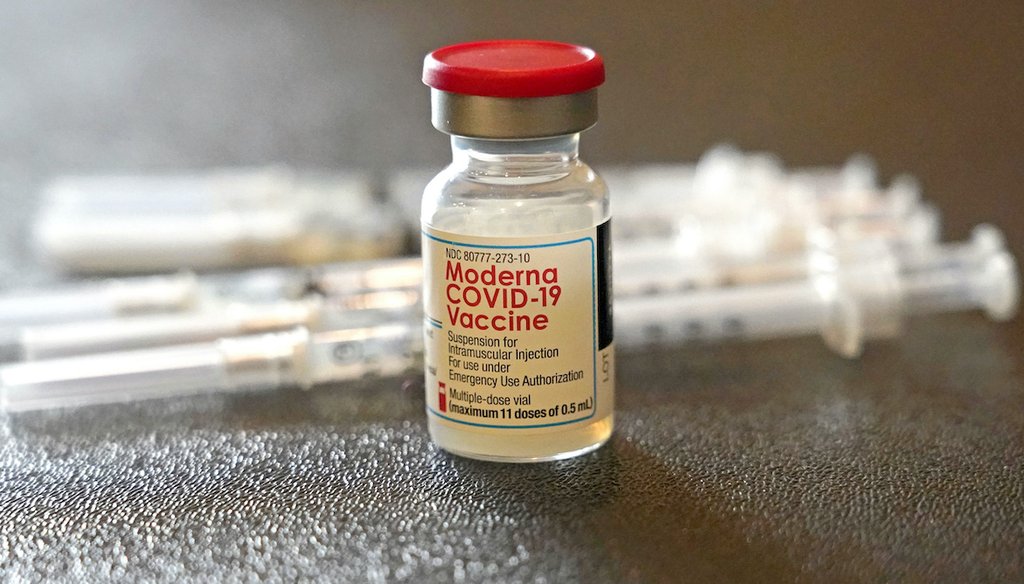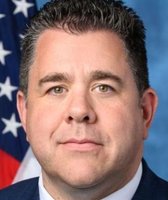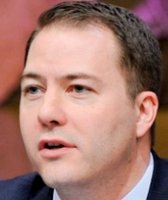Stand up for the facts!
Our only agenda is to publish the truth so you can be an informed participant in democracy.
We need your help.
I would like to contribute

A vial filled with the Moderna COVID-19 vaccine rests by syringes waiting to be loaded by nurses from the Jackson-Hinds Comprehensive Health Center, at a vaccination station next to Jackson State University in Jackson, Miss., Tuesday, Dec. 7, 2021. (AP)
If Your Time is short
- Claims that the government co-owns a COVID-19 vaccine and has "ulterior motives" to mandate it are unfounded.
- The government does not co-own the vaccine, according to the National Institutes of Health.
- The NIH and Moderna disagree over whether government scientists should be credited as inventors on patent applications for the vaccine. The result could have long-term consequences for global vaccine access.
In an episode of Glenn Beck’s Blaze TV program that has been clipped and widely shared on Facebook and TikTok, Beck holds up a stack of papers for the camera.
"This is 153 pages of the confidential agreement between Moderna and the U.S. government and it goes back to 2015," Beck says.
He then goes on to say that the papers reveal the U.S. government has "ulterior motives" in mandating the coronavirus vaccines. "Did you know the government co-owns the vaccine?... the same government that is now mandating its use owns the vaccine?"
The video was flagged as part of Facebook’s efforts to combat false news and misinformation on its News Feed. (Read more about our partnership with Facebook.)
Is it true that the government "owns the vaccine," as Beck said? In short, no.
But, as the New York Times reported Nov. 9, there is a long-brewing disagreement between Moderna and the National Institutes of Health over who developed a crucial part of the COVID-19 vaccine known as the mRNA sequence — and that could have implications for ownership of important patents related to the vaccine.
There are various patent applications related to this vaccine, and Public Citizen, an advocacy group, has been urging the government to assert its interests as inventors. Public Citizen said on Nov. 2 that Moderna left off government scientists in three patent applications, and government scientists are credited as co-inventors on only one application.
The NIH neither owns, nor co-owns, the COVID vaccine that was developed by Moderna and NIH, according to a statement from Mark L. Rohrbaugh, the NIH special advisor for technology transfer.
But, as the Times reported, the NIH believes that three of its scientists worked with Moderna and played a major role in making important discoveries that led to the Moderna vaccine.
Moderna disagrees — and said so in a July filing with the U.S. Patent and Trademark Office; its patent application names its own employees as the sole inventors of the mRNA sequence, which is considered the principal component of the vaccine.
A lot of money is at stake, as well as a big say in the distribution of vaccines worldwide. If the NIH scientists were named as inventors on the sequence patent, that would enable the government to collect royalties on the patent and to license it as it sees fit, including, some have noted, to other vaccine manufacturers besides Moderna. The result could have long-term consequences for global vaccine access.
In 2020, NIH scientists collaborated with Moderna to design and test the COVID-19 vaccine that Moderna manufactures and sells, known as mRNA-1273, Rohrbaugh said. The collaboration evolved from one originally focused on the development and testing of mRNA vaccines to combat the zoonotic virus Nipah and MERS, a coronavirus related to SARS and SARS-CoV-2.
The 2015 agreement that Beck appears to be citing in his video was between the NIAID and Moderna. It was an agreement to exchange confidential information to allow the parties to explore possible interest in collaborating, according to the NIH.
In his video, Beck referenced a material transfer agreement among the University of North Carolina, NIAID, and Moderna, and said it was from 2015. However, that material transfer agreement was executed in 2019, according to the NIH, before SARS-CoV-2 had been identified as the cause of COVID-19 and its nucleotide sequence determined. These materials emerged from NIAID’s collaboration with Moderna on the development of a MERS vaccine.
That collaboration between Moderna and NIH on the COVID-19 vaccine addressed neither co-ownership of vaccine candidates developed by NIH and Moderna nor inventorship on or co-ownership of patents arising from the collaboration, Rohrbaugh said. The NIH says that a material transfer agreement is used to transfer materials between laboratories, "generally for non-commercial research purposes." The material transfer agreement from 2019, which NIH said pre-dates work on a vaccine specific to COVID-19, said that the NIH would share mRNA coronavirus vaccine candidates developed and jointly owned by NIAID and Moderna.
Of the ongoing disagreement between NIH and Moderna over who invented a part of the COVID-19 vaccine, NIH Director Francis Collins told Reuters in November: "I think Moderna has made a serious mistake here in not providing the kind of co-inventorship credit to people who played a major role in the development of the vaccine that they're now making a fair amount of money off of."
On Nov. 11, Moderna released a statement saying that it did not agree that government scientists "co-invented claims to the mRNA (modified nucleotide) sequence of our COVID-19 vaccine." The statement continued:
"Moderna remains the only company to have pledged not to enforce its COVID-19 intellectual property during the pandemic. Moreover, on September 29th, Moderna offered to resolve its dispute with NIAID by making the government co-owners of those patent applications that only listed Moderna scientists as inventors, including the right as co-owners to license the patents as they see fit."
According to the journal Nature, such an offer from Moderna to make the NIH scientists co-owners of the patent — rather than co-inventors — would be subject to negotiation and "could come with strings attached." Collins said that the dispute would be something that "legal authorities" figure out.
But Rohrbaugh said the disagreement reported in the Times relates to inventors listed on patent applications Moderna filed that cover the mRNA-1273 vaccine, not to ownership of the vaccine, as Beck’s claim implied.
Mark Lemley, an intellectual property law scholar at Stanford Law School, rejected the idea that the government has "ulterior motives" in mandating the vaccine. "The government has paid billions of dollars to Moderna for the vaccine," he said. "And it has not shown favoritism toward Moderna over the Pfizer vaccine, where there is no claim the government scientists were involved in the invention."
Another intellectual property expert, James Love, said that the United States does have some rights in the Moderna patented inventions already, including patents already licensed to Moderna by the NIH and patents, like this one, where the U.S. is challenging the decision by Moderna to exclude NIH employees as co-inventors, Love said.
Love also rejected the idea that the government has an ulterior motive for mandating the vaccine. Love, director of Knowledge Ecology International, a nonprofit that works around the world to distribute knowledge resources in underserved places, said that the United States is spending billions of dollars to buy the vaccine from Moderna, and that it "spends more than it gets, by a big margin."
Our Sources
Facebook, video clip of Glenn Beck, posted Nov. 23, 2021. Accessed Nov. 30, 2021.
PolitiFact, "Scientists developing mRNA vaccines before outbreak isn’t evidence COVID-19 pandemic was created," June 25, 2021. Accessed Nov. 30, 2021.
New York Times, "Moderna and U.S. at Odds Over Vaccine Patent Rights," Accessed Nov. 30, 2021.
Emailed statement, Mark L. Rohrbaugh, Ph.D., J.D., NIH special advisor for technology transfer, Nov. 30, 2021.
Email interview, Mark A. Lemley, William H. Neukom professor of law, Stanford Law School, and director of the Stanford Program in Law, Science and Technology, Dec. 1, 2021.
NIH-Moderna confidential documents, via Axios, on Document Cloud. Accessed Nov. 30, 2021.
Email interview, James Love, director, Knowledge Ecology International, Dec. 1, 2021.
Reuters, "Moderna COVID-19 vaccine patent dispute headed to court, U.S. NIH head says," Nov. 11, 2021. Accessed Dec. 2, 2021.
CBS News, "Moderna offers NIH co-ownership of COVID vaccine patent amid dispute with government," Nov. 15, 2021. Accessed Dec. 1, 2021.
White House, "Fact Sheet: Biden Administration Announces Details of Two Major Vaccination Policies," Nov. 4, 2021. Accessed Dec. 1, 2021.
Phone interview, Shubha Ghosh, J.D., Ph.D., Crandall Melvin Professor of Law, director, Syracuse Intellectual Property Law Institute, Syracuse University, Dec. 7, 2021.
Moderna, "Statement on Intellectual Property," Nov. 11, 2021. Accessed Dec. 7, 2021.
Nature, "What the Moderna–NIH COVID vaccine patent fight means for research," Nov. 30, 2021. Accessed Dec. 7, 2021.
NIH National Institute of Allergy and Infectious Diseases, news release, "Promising Interim Results from Clinical Trial of NIH-Moderna COVID-19 Vaccine," Nov. 16, 2020. Accessed Dec 7, 2021.
The Conversation, "Why Moderna won’t share rights to the COVID-19 vaccine with the government that paid for its development," Nov. 18, 2021. Accessed Dec. 7, 2021.
Congressional Research Service, Legal Sidebar, "COVID-19 Medical Countermeasures: Intellectual Property and Affordability," March 18, 2020. Accessed Dec. 8, 2021.
Public Citizen, letter to National Institutes of Health, Nov. 2, 2021. Accessed Dec. 9, 2021.












































